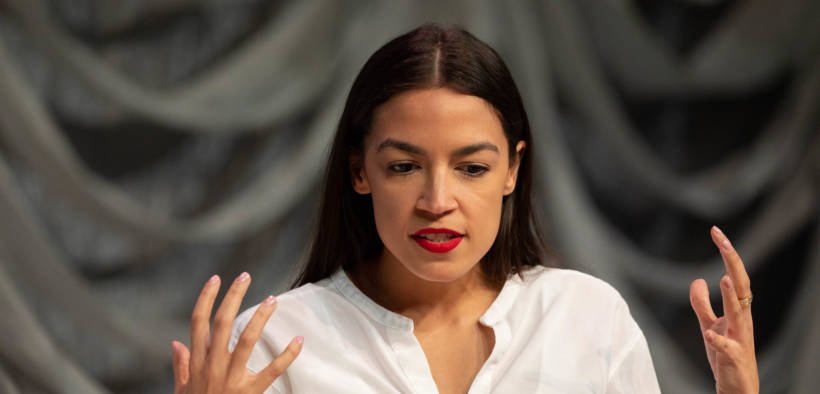Ocasio-Cortez Bill Would Drastically Raise Poverty Line for Federal Income Threshold

Ocasio-Cortez wants the federal government to acknowledge hundreds of thousands more Americans as living in poverty with The Recognizing Poverty Act.
A new bill called The Recognizing Poverty Act introduced by Rep. Alexandria Ocasio-Cortez, D-N.Y., last November could result in tripling the guidelines for the federal poverty income level and open up taxpayer-funded benefits to scores of new citizens. If signed into law, the bill would direct federal agencies to reconsider the federal poverty guidelines and introduce new metrics to be taken into calculation for determining the federal poverty level.
Presently, the federal poverty level is set at $12,490 for households of one and $16,910 for a two-person household, rising with each additional member. The guidelines can affect a family’s qualification for food stamps and other programs such as housing aid and healthcare. Families with school-aged children might also qualify for free or reduced-price school lunches based on the poverty line.
As Jesse Rifkin of GovTrack Insider points out, the current poverty level numbers are so low that it is common for programs to use a multiple of it. Such is the case with The Affordable Care Act, which gives health insurance tax credits to persons earning up to 400 percent of the federal poverty level.
Ending Special Treatment for Alaska and Hawaii
Currently, the federal poverty level also sets different bars for Alaska and Hawaii, which begin at $15,600 and $14,380, respectively. However, in places like California the cost of living is also drastically higher than that of places like Kansas. An Experian study by Stefan Lembo Stolba referenced data from Zillow that compared the median home costs across the states and Washington, D.C. By that measurement, West Virginia was the most affordable with an average home value of $99,000, while Hawaii topped the list at $619,000 and California came in third with a median home value of $550,800.
Alaska had the tenth highest median home value. While it was only one metric to judge the cost of living, to some observers, including New York-born Ocasio-Cortez, it may seem unfair that Alaska is given its own poverty line. The practice dates back to the 1966-1970 period, according to the Department of Health and Human Services (HHS), less than a decade after each gained statehood.
Furthermore, while the two newest states were separated in the poverty guidelines, which determine eligibility for government programs, they were never distinguished in the federal poverty threshold – not to be confused with the poverty guideline. The threshold is primarily used for statistical purposes and is updated annually by the US Census Bureau. HHS makes clear the distinction that poverty guidelines, which Ocasio-Cortez’s legislation pertains to, are dictated by HHS – not the Census Bureau – and are derived, in part, from the poverty threshold preceding it.
When the first threshold and guidelines were set in the mid-1960s, the economic nature of the U.S. was understandably vastly different. Silicon Valley, for example, was in its infancy in the ‘60s. Microsoft, headquartered in Washington state, was not even founded, nor was its neighbor, Amazon.
The Recognizing Poverty Act would direct the HHS to devise a new formula, which may eliminate the independent guidelines for Alaska and Hawaii.
Part of a Larger Poverty Initiative
The Recognizing Poverty Act doesn’t set specific income levels for the federal poverty guidelines but instead would force HHS to factor in the costs of living across states and even individual cities. The costs of expenditures like health insurance, child care, work expenses and even internet access would be included.
Ocasio-Cortez and supporters of The Recognizing Poverty Act think the current federal poverty guidelines drastically underestimate how many Americans are actually living in poverty. While critics worry increasing the guidelines would drastically increase taxpayer spending and give benefits to those who don’t actually need them.
“I think one of the things that, that we can get done is build popular support in acknowledging how bad the problem already is. In doing so, we can actually begin to fundamentally address those problems,” Ocasio-Cortez told NPR’s Steve Inskeep. “If we can acknowledge how many Americans are actually in poverty I think that we can start to address some of the more systemic issues in our economy.”
Whereas Brad Palumbo for the Washington Examiner wrote, “The socialist congresswoman has said she thinks the poverty line should be as high as $38,000 in annual salary. This would triple poverty overnight, classifying many working-class, self-sufficient Americans as if they were in dire need of government intervention.”
The Census Bureau last reported roughly 40 million people are impoverished, over 10 percent of the population. Controversially, Ocasio-Cortez would like to see undocumented immigrants given access to government benefits. She revealed the plan in tandem with The Recognizing Poverty Act. Together, she named the five bills the “Just Society” proposal, reported Daniel Trotta for Reuters.
Each component of her Just Society proposal is a separate bill and could be passed independently of one another, a move that was likely designed to encourage support of milder legislation, such as the poverty guideline bill.
The legislation was referred to The House Committee on Education and Labor immediately after it was introduced but no action has been taken on it since then.
According to HHS, new guidelines for 2020 will be published Jan. 20 to 24.















